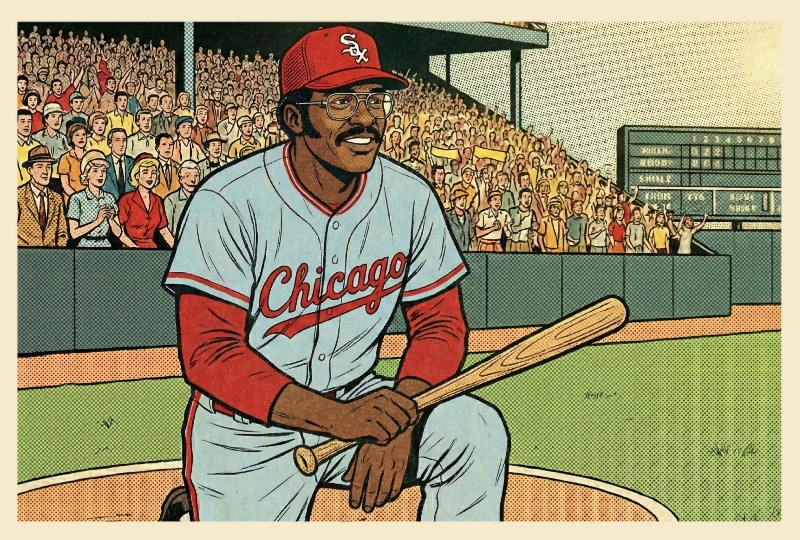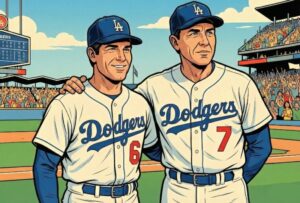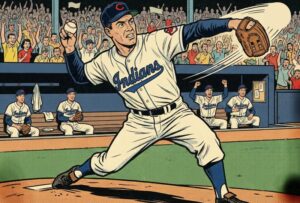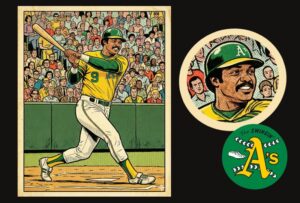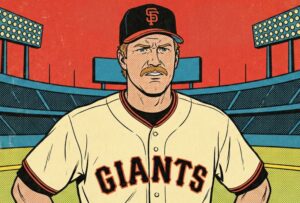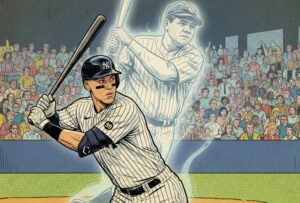The Classic Baseball Era Committee has elected Dick Allen to the Hall of Fame, righting a wrong that had loomed over the history of the game for several decades.
While many baseball fans probably had no trouble sleeping at night when the Hall of Fame existed without Dick Allen as a member, for others the slight was egregious. Including this baseball fan.
For the entirety of his career, Allen was one of baseball’s most dangerous and productive hitters. The numbers tell a truth that for some reason Hall of Fame voters ignored for years. More on those reasons below, but first the numbers:
Dick Allen Compared to First Basemen Post 1960
This table lists the top 10 first basemen who began their career after 1960, ranked by OPS+. It also includes every Hall of Fame first baseman from this “Expansion Era.”
| PLAYER | AVG | OBP | SLG | OPS | OPS+ | WAR |
| Mark McGwire | .263 | .394 | .588 | .982 | 163 | 62.1 |
| Dick Allen | .292 | .378 | .534 | .912 | 156 | 58.7 |
| Jeff Bagwell | .297 | .408 | .540 | .948 | 149 | 79.9 |
| Jim Thome | .276 | .402 | .554 | .956 | 147 | 73.1 |
| Willie McCovey | .268 | .373 | .511 | .884 | 146 | 61.3 |
| Albert Pujols | .296 | .374 | .544 | .918 | 145 | 101.5 |
| Lance Berkman | .293 | .406 | .537 | .943 | 144 | 51.9 |
| Joey Votto | .294 | .409 | .511 | .920 | 144 | 64.5 |
| Freddie Freeman | .300 | .387 | .512 | .899 | 142 | 60.7 |
| Miguel Cabrera | .306 | .382 | .518 | .901 | 140 | 67.1 |
| Fred McGriff | .284 | .377 | .509 | .886 | 134 | 52.6 |
| Eddie Murray | .287 | .359 | .476 | .836 | 129 | 68.7 |
| Tony Pérez | .279 | .341 | .463 | .804 | 122 | 53.9 |
Note that Dick Allen ranks second since 1960 in OPS+ by a first baseman (at least 40% of games played at 1B). How could this absolute beast of a hitter be underrated and un-elected by HOF voters for so long?
Hall of Fame Voters Don’t Understand how Baseball Changes
It comes down to a misunderstanding of relative performance. Clearly, some voters failed to understand how the game of baseball has changed from era to era, and how those changes impact the statistical record.
Dick Allen basically hit like Albert Pujols: his batting average, slugging, and on-base percentage are nearly identical. However, when Allen played, run scoring was far lower than it was when Phat Albert was in uniform. In 2005 when Pujols won his first MVP, the National League had a 744 OPS and averaged 4.45 runs per game. In 1972, when Allen won the AL MVP, the league had a 649 OPS and scored 3.47 runs per game.
In 1966, Allen led his league in OPS, in a season where only three players had at least 40 home runs, and only 17 MLB batters had a .500 SLG. Forty years later, Pujols led the league in OPS for the first time. In that season, 11 players had 40+ HR, and there were 46 batters with a slugging percentage of .500 or higher. Even if we account for the greater number of teams, that’s a striking difference.
Being a dangerous hitter in 1966 looked different than it did in 2006. Offense was essentially down by 20 percent in Allen’s career, compared to the Pujols Era.
This is not to suggest that Allen was a better hitter than Pujols. The latter performed his feats over about 1,200 more games than the former. But, it’s not like Allen was a short-termer: he played 15 seasons, hit 351 home runs, and qualified for the batting title ten times.
Why Voters Made Dick Allen Wait
Voters didn’t shun Allen because he had a short career. There were three primary reasons it took 41 years since he was first eligible for Allen to be honored by Cooperstown:
No. 1: Voters don’t understand the difference in statistics relative to the era in which a player was active.
No. 2: Allen failed to reach milestones that some HOF voters covet, such as 500 HR and 2,000 hits.
No. 3: The stories of Allen’s behavior as a selfish player had a longer shelf life than his on-field performance, which was brilliant.
On that last point, it’s important to point out the damning influence of baseball author Bill James. In his writing, beginning in the 1980s, James spent much effort ridiculing Allen as a negative player.
Allen, James wrote in his Historical Baseball Abstract (1994), “did more to keep his teams from winning than anyone else who ever played Major League Baseball. And if that’s a Hall of Famer, I’m a lug nut.”
What did James have against Dick Allen? His writings reveal a contempt for Allen’s personality, citing his controversial dealings with the Phillies’ front office in the 1960s. James also seems to suggest that Allen’s movement from the Phils to the Cardinals to the Dodgers to the White Sox from 1969-1971 was indicative of his negative impact on his teams. That’s peculiar, since Allen ranked third in MLB in OPS+ for the seasons 1969-1972, nestled between Hank Aaron and Willie Stargell. He was 20th in WAR, 10th in home runs, and 11th in RBI.
James would have you believe the folks watching baseball in that era were morons, because they gave Allen MVP votes in seven separate seasons. Or that contemporary managers and players knew less than he does, seeing as how Allen was selected for the All-Star team seven times in a 10-year period.
Not once in his mounds of criticism for Allen does James mention that the ballplayer came up with the Philadelphia Phillies, the least progressive team in the National League. Allen made his professional debut only 23 months after the Phillies became the last NL team to integrate. The Phillies didn’t play their first black player until more than 10 years after Jackie Robinson debuted. Allen matured in a farm system that still carried a racial bias against black players. As he matured, and as he earned currency as one of baseball’s best players, Allen challenged the status quo. That vigilance was seen by some as a black man “being uppity.” James does a disservice in accepting that narrative.
Gradually over the years since he penned his scathing attack on Dick Allen, Bill James has shown his true colors through vitriolic, prejudicial, and far right-wing opinions shared on social media and his now defunct website. To many, James has devolved into the Rush Limbaugh of baseball historians and analytics: a curmudgeon who can’t help but tell everyone that he’s the smartest man in the room. Since his foolish assertions that Pete Rose did not bet on baseball, few discerning people have taken James seriously. Strangely, James has never criticized first baseman Keith Hernandez for being detrimental to his teams, despite the fact that the Cardinals dumped him due to that very reason.
Now, a 16-person voting committee has finally taken Dick Allen off the Bill James enemies list and put him where he belongs: in the plaque gallery in Cooperstown.

